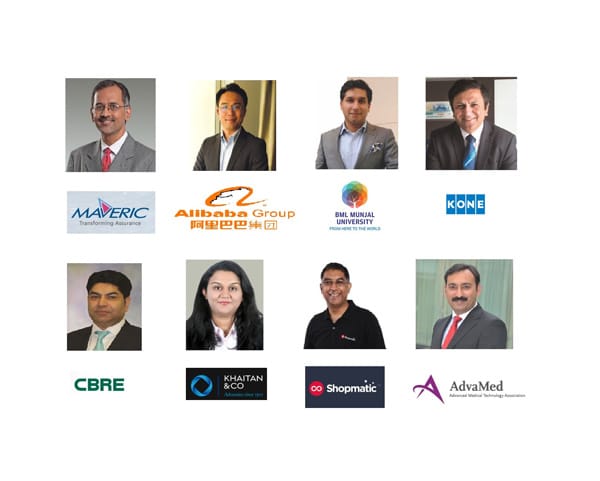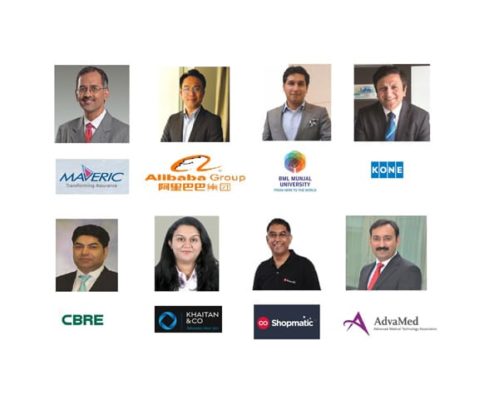
The long awaited Union Budget 2017 announcement was made today by the Union of India Finance Minister, Shri Arun Jaitley. India Inc.’s business leaders gave their reactions to Team Estrade on this announcement. Following is the first in series of these India Inc.’s reactions,


Anshuman Magazine, Chairman – CBRE, India and South East Asia
“Overall, the Union Budget 2017 augurs well for real estate, affordable housing and the infrastructure segment.
The affordable housing sector is finally set to get infrastructure status. This was a long-awaited announcement. While we are yet to read the fine-print, this is indeed an important step to promote access to priority lending thereby spurring supply of low cost housing units across various cities in India. Relaxation in area measurement as well as completion timelines to seek tax exemption are welcome steps. Further, the government has also increased allocation under the PMAY scheme. This will encourage home buyers and further boost participation from the Private players.
The airport authority of land act amendment is yet another positive move which will allow development of land around the airports. This will further improve infrastructure and more importantly increase funding for the development of the airports. This is over and above the record allocation made to the overall infrastructure sector.
In order to encourage greater fund flows into the economy, the FM has announced abolition of the FIPB. While a clear policy outline is yet to be revealed, this is another positive step to liberalize FDI policy framework and ease regulatory hurdles in attracting investments.
The government has also been accommodative of the concerns of the real estate sector. The relaxation on long term capital gains, joint development agreements, tax rebates for builders will help reduce their tax liability. While greater rebates were expected in individual tax rates, nonetheless the rebate for individuals earning upto 5 lacs will help increase their disposable incomes. This might help spur consumption and also have a positive impact on demand for housing. ”

Venkatesh P, Director- Platforms and Solutions, Maveric Systems
“There is a credible shift in terms of social spend and an acknowledgement of things that need roll back like MAT. The focus on MSME is welcome given its ability to generate employment across the nation. It is always better to look at the focus of the budget- it lists ten themes, six of which relates to social sector; nothing on spurring economic growth or promoting investment; it looks like the emphasis is on the social development than economic growth, but unfortunately it is an inference than a clear statement of the budget.”

Kenny Ye, GM-Overseas Business, Alibaba Mobile Business Group
“A BUDGET FOR THE MASSES”
“Union Budget 2017-18 is a big relief for the common masses – from reduction in personal income tax to sops for affordable housing- the Finance Minister has announced various measures to benefit farmers and weaker sections of the society. On the corporate side, abolishing of FIPB is a bold step and further liberalization of FDI policy will cheer foreign investors. While last year’s auctions removed spectrum scarcity in the country, expansion of Bharat Net project will ensure high-speed broadband to 1.5 lakh gram panchayats via Wifi. With increasing smartphone penetration and push for high-speed broadband connectivity in rural areas, a massive digital revolution is imminent in India. Lastly, reduction of corporate tax for MSMEs is a welcome step but larger Indian conglomerates looking to compete with global peers will continue to find the tax rate challenging.”
“welcome the efforts towards providing quality education in STEM” – Akshay Munjal, BML Munjal University

Akshay Munjal, President BML Munjal University
“This year’s budget sees welcome initiatives that will bolster the education industry in India. We welcome the efforts towards providing quality education in STEM across primary and secondary schools in India. The launch of the Swayam platform, the upliftment of 3,479 educationally backward blocks, the setting up of the National Testing Agency and 100 skill centres across India will make quality education accessible and available to the masses and will help empower a generation of future leaders. This will lead to an overall improvement of educational facilities throughout the country, particularly in Tier-2 and Tier-3 cities. Though these are significant steps in the right direction, we would have also welcomed further constructive investment towards R&D infrastructure.”

Rashmi Deshpande, Associate Partner – Khaitan & Co. (Real Estate)
The Union Budget 2017 has set out certain proposals which are a welcome move for the real estate sector
(i) Low Cost Housing: The criteria for low cost / affordable housing has been changed from built-up area of 30 / 60 sq mtrs to carpet area of 30/60 sq mtrs, thus making the low cost – affordable housing segment more lucrative for the builders and also making the segment more attractive for the buyers. With the change in criteria from built-up area to carpet area, the purchasers get more spacious homes and the builder is able to market the property to a larger segment of buyers.
Also the tax break of 1 year post receipt of the completion certificate, for the unsold stock, gives a slight breather to the builders.
(ii) Reduction in Income tax rate for basic slab: Will help broaden the tax net and also increase the disposable income in the hands of the tax payers coming within the category. This, coupled with the incentives on low cost housing and the reduction in interest rates by banks, is likely to promote thrust in the affordable housing segment.
(iii) Taxation of Capital Gains of Joint Development Agreement: The budget proposes to change the prevalent practice and has clarified that the landowner entering into a joint development agreement for development of the property, shall be subject to capital gains tax upon completion of the project. This is a significant change, which is much needed, to bring clarity on the aspect and avoid litigation with the department, which was invariably a norm given the current ambiguity.

Varun Khanna, Chairman – AdvaMed India (Working Group and Exec. Committee) & MD, BD India
“The budget provides a feel good factor for the medical devices and healthcare sector. We are encouraged to see that healthcare has been given its due attention in the Union Budget this year. The increase in health expenditure by 20 percent reflects greatly on the government’s intent to prioritize healthcare in India. This can be a key determinant of an ecosystem that is better equipped to provide comprehensive healthcare to all. AdvaMed also welcomes the government’s resolve to eliminate TB by 2025 and increase in funding for women and child welfare to Rs 1,84,362 crore. There is still a greater need to invest in screening and preventive measures for addressing the growing TB burden. The government’s recognition of the need to strengthen healthcare infrastructure by building capacity is also showcased in their move to increase health expenditure by 20 percent, as well as introduce two new AIIMS centres, add 5,000 PG seats for medical sciences and transform 1.5 lakh health sub-centres into health wellness centres. While these measures are a step in the right direction, NCDs that account for 53% of the disease burden should have been prioritized.
Moreover, abolishing FIPB shows India more welcoming of FDI and relaxation of protectionist barriers. AdvaMed welcomes the government’s plan to internationally harmonize the new medical device rules and attract investment into the medical device sector. This showcases recognition of the role of medical devices in meeting the healthcare needs of India’s population. While the budget exhibited many positives, the Finance Minister could have done more to bring the much-needed momentum in the growth of the country as a med tech hub and a leading global destination for life sciences. The association is disappointed as the budget missed out on addressing higher import duties deterring introduction of innovative and high-quality devices for better patient care in India. We were hoping for excise duty reduction on medical devices in areas of critical care and duty reductions to life saving technologies to reduce the cost of treatment and burden on patients.
Our industry continues to urge the government of India to implement a separate regulatory framework for the medical devices sector which will enable international and domestic manufacturers better address the needs – availability, affordability and access – of Indian patients and give the much needed fillip to the sector.”
“great to see improvement on the high speed broadband connection in rural and tier 2 and 3 cities” – Anurag Avula, Shopmatic

Anurag Avula, CEO and Founder – Shopmatic
“It’s agreeable to see positive reforms being proposed in favour of digital pay systems for the common man, more specifically in rural and semi-urban areas. The move for forming reduction on tax for small and medium enterprises’ is a boost to “The Make in India initiative”, that will encourage the nation to keep in lines with motivational 2017-2018 budget theme of Transform, energize and clean India.
It’s also great to see improvement on the high speed broadband connection in rural and tier 2 and 3 cities, which further nurtures the country’s tech essence. What is interesting to note is the government’s interest in start-ups and on energising youth & creating jobs. The Profit linked-deductions for start-ups that has been reduced to 3 years out of 7 years, will certainly ease the process.
In all its completeness we are quite pleased with the start-up and SME announcements. We believe that the fresh moves made will cultivate the rising upsurge of tech and digital initiatives to further energize the GDP of our nation.”
“heartening to hear about the Digital theme focused measures” – Aneesh Reddy, Capillary Technologies
“Housing for All” is currently in the Top priority list of this Government – Amit Gossain, KONE India
With the rate of urbanisation on an increase, thousands of people are moving to cities every day, which automatically brings in the need for good housing. With land becoming scarce, the shift to vertical cities is the way forward. It also means the need for better infrastructure like airports, metros etc, become important, which can help in improving connectivity. Thus the need to provide smooth, safe and convenient people flow solutions like elevators & escalators becomes mandatory. These changes definitely will support the growth of the industry. India has the world’s second largest Elevator & Escalator (E&E) market today, after China, with the current market size at 50,000 units p.a. This Industry in India is poised to grow at a CAGR rate of 7-8% in the next five years.Demand of the Real Estate Sector to be included in Priority sector has long been pending. This Budget is giving a hope that it is being fulfilled. This will provide support, growth and a favorable ecosystem for the Real Estate Sector and for all its stakeholders. This year brings in a lot of confidence for the Real Estate sector and in turn is expected to elevate the growth of Elevator and Escalator Industry as well. There are a lot of expectations from this Budget.
Green Buildings should also receive Tax Exemptions so that the construction of the same can be incentivized. This will create awareness of the Energy Efficient Elevators. There would be a need for further reduction of carbon footprint and construction of intelligent buildings with smoother people flow. So it becomes essential to provide smart & eco efficient vertical mobility solutions to support in better energy and traffic management.
Larger share of Elevators demands arises from Residential Segment. Affordable Housing or “Housing for All” is currently in the Top priority list of this Government. Moreover, Investment on other Infrastructure Projects such as Smart City Mission, AMRUT and HRIDAY are further expected to boost the demands of Elevators and Escalators
There is a need for more clarity on REIT and this will open a lot more opportunities for the Realty Sector to get easy funding and ensure timely completion of projects. Relaxation of FDI, promoting single-window clearances for ease of doing business and GST-related benefits for the Real Estate Sector will foster positive changes and certainly help both Investors and Buyers. Together all this could be a game changer for the Real Estate Sector and will further improve transparency and investor confidence in the Real Estate market in the long run.
With a slew of Government Policies such as RERA, GST and REIT in the last few years, the Real Estate Sector needs ongoing support by the government to guide it towards a long lasting road of development!









